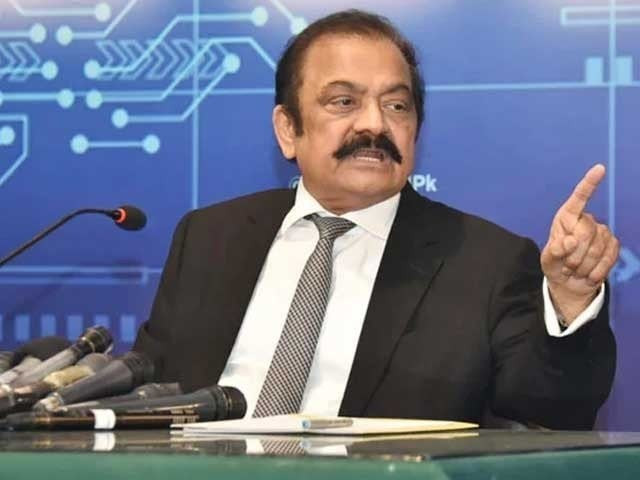Rana dangles threat of governor rule in Punjab
Says if any province bans entry of interior minister, it will be sufficient ground for governor rule

Interior Minister Rana Sanaullah revealed on Wednesday that his ministry had started the spadework on imposition of governor’s rule in Punjab, a day after the Supreme Court verdict ended the chief ministership of Hamza Shahbaz and declared his rival Chaudhry Pervaiz Elahi as the chief minister.
In a series of media talks, Rana Sanaullah said that if the court decisions became controversial, it would increase instability in the country, which in turn would spur price hike. However, he stressed that no-one could curtail the powers of judiciary but these powers must be regulated.
The minister warned that it would be wrong to assume that the federal government had limited powers. He emphasised that two provinces of the country, Sindh and Balochistan, were still governed by the allied parties of the ruling Pakistan Muslim League-Nawaz.
“Some people say that so-and-so will be stopped from entering Punjab [after Elahi – an ally of the opposition Pakistan Tehreek-e-Insaf (PTI) becomes the chief minister],” Rana Sanaullah told the media after the passing-out ceremony of the Frontier Constabulary (FC) at the Islamabad Police Lines.
“They should know that the summary for governor’s rule is sent by the interior ministry on which the work has been started. If my entry into Punjab is blocked, it will be enough reason for the governor's rule,” the minister added.
Sanaullah said that the political situation deteriorated after the Supreme Court decision on Tuesday. “The increase in the value of the dollar is mainly due to the political instability of the country, which is because of the controversial decisions of the judiciary,” he added.
“Earlier, the court said that the votes of 25 dissident members [of the PTI in favour of the PML-N ] would not be counted, but in the case of Parvaiz Elahi, the votes of 10 dissident members were counted,” he said, adding that there was an ambiguity in the court orders.
Responding to a question about the cabinet decision to introduce judicial reforms, the minister stressed that the issue of independent judiciary was not the responsibility of the PML-N, or the politicians alone, but of all institutions.
“No one can curtail the powers of the Judiciary but these powers should be regulated. We are not giving the power to form benches and the power to taking suo motu notice to the prime minister, we just want that there should be consultation with three or five judges,” he explained. “It will increase the respect and honour of the judiciary.”
When asked about the corruption cases, the minister said that corruption cases against former prime minister and the PTI Chairman Imran Khan and his family friend Farah Gogi were in the National Accountability Bureau (NAB).
He added that a case against Farah Gogi was in the Punjab Anti-Corruption Establishment (ACE), which would be closed by the new Punjab government, but there was another case in NAB. If there was evidence of corruption, a case would be filed.
He said that unlike the previous government, they did not file cases against any opponent. “This is not our job. Institutions are working [on the cases] but we are not in favour of holding a press conference before taking the matter to court,” he added.
The minister told reporters that there were allegations of corruption against Imran. “Imran Khan could not answer Toshakhana case. He incurred Rs50 billion loss to the national treasury. He gave away a property worth Rs5 billion to a trust, whose trustees are Imran Khan and [his wife] Bushra Bibi,” he said.
Responding to another question, the minister said that after the success of the no-confidence motion against then prime minister Imran Khan, the PML-N wanted general election but continued in the government on the advice of patriotic circles and allies.
“The patriotic circles said that Imran Khan as the prime minister has sunk the country's economy. If we don't take over the government, the country will go bankrupt. So, we took over the reins of the government and brought the country out of the danger of bankruptcy.”
Earlier, speaking to the media at the Parliament House, the interior minister said that the PML-N was not talking to anyone, but added that senior PTI leader Pervez Khattak had sent a message “to one of our man” for a meeting.
He said that in the current situation, no single leader or party could decide about calling the elections. “If the National Assembly is dissolved, will we go into the election under these provincial governments?” he asked.
About the governor’s rule, the minister said that if the prime minister sent any advice, then the president has to follow it. “If he does not do it, then after 10 days the advice will be implemented automatically,” the minister emphasised.
“The issue was also discussed in the federal cabinet meeting that if any provincial government imposes a ban on the entry of the interior minister, then it will be enough justification for imposing the governor's rule in the province.”



















COMMENTS
Comments are moderated and generally will be posted if they are on-topic and not abusive.
For more information, please see our Comments FAQ